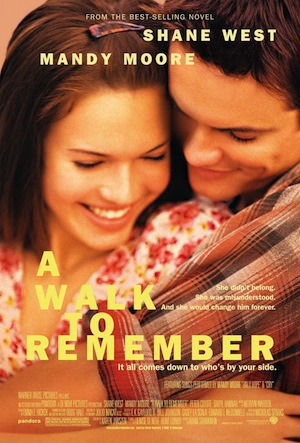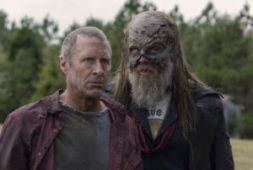
Main Point: While God instructs us to look toward the needs of others, we are not meant to be treated with disrespect. Setting relational boundaries is healthy in friendships.
Plot Outline: This is the story of two North Carolina teens, Landon Carter (West) and Jaime Sullivan (Moore), who are thrown together after Landon gets into trouble and must do community service. Jamie’s character is unusual by today’s perspective of teens. Her conservative morals and humble behavior make her an easy target for put-downs at school. Landon is intrigued by her but unable to treat her with kindness in front of his peers at school.
Before You Meet: The topic of relational boundaries is subjective. Small groups will be discussing appropriate manners of boundary-setting. Please discuss the topic with your leaders before they meet with students because, the truth is, quite often we adults don’t do very well with boundaries.
Opening Activity:
Turn to the person sitting next to you. If you are not directly next to someone, move so that you are.
(If you have an odd number of participants, you, the leader should also take part in this activity to make numbers even.)
Now that everyone has a partner, stand and face each other. Now, I want you to make eye contact and hold eye contact. You can blink, but do not break eye contact. Now, I just want you to move as close as you can to your partner before you feel uncomfortable. Go!
(Pause for a short moment and allow students to move toward partners. It’s ok if there is laughter, it will help prove your point!)
After a minute say, “Thanks, go ahead and have a seat.”
Ask a few in the crowd: “What was easy about that activity?” Now Ask a few more: “What might have been difficult about that activity?”
We all have personal boundaries. Even when we have been taught that making eye contact shows respect, it’s still difficult to KEEP eye contact. And standing really close to someone? That can be very uncomfortable! My friend calls the area around herself her “space bubble.” If I stand too close to her or if her kids are crowding her she says, “Hey, you’re popping my space bubble!” Some call it your “space box.”
In the same way that we have this natural desire for an invisible boundary around us, like a space bubble, we also have relational boundaries. It’s difficult to figure out what these boundaries should be. For example, it might be funny when your friends call you a name and you know they’re joking. Like a friend of mine (a guy) who has long hair, I sometimes call him “girlie-man.” He knows I’m joking but I also know when my joke isn’t funny anymore; it might even have become hurtful. Another example could be a friend at school who always borrows stuff. “Can I use a pencil? Do you have any paper? Can I borrow a dollar for lunch?” Eventually that might begin to bother you and you would have to create a relational boundary.
Introduce the Movie:
A Walk to Remember is about a quiet girl, Jamie, who has a strict dad and values her faith and morals. She meets this guy, Landon Carter, who has gotten in trouble for a prank and is sentenced to community service. Landon seems interested in Jamie, but also tries hard to look cool around his friends. Being kind to the quiet girl isn’t considered cool and Landon ends up acting like a jerk. Watch this clip…
Start the DVD at 30:00
This scene takes place in the hall at school. Note that reference is made to “Virgin Mary.” If this is offensive for your group, simply fast-forward past the comments. Make sure you start the scene as Jamie approaches the group and says, “Hey Carter, so I’ll see you after school?” After their interaction, the scene changes to the doorstep of Jamie’s house where Landon comes to get help memorizing lines for the school play. Key dialogue follows.
NOTE: When the conversation ends, Jamie goes inside and closes the door. Landon turns and curses as he descends the steps. If you don’t want your kids to hear “Damn-It!” you can turn the DVD off when she closes the door.
- Scene Script: (Takes place on doorstep of Jamie’s house.)
Landon: Look Jamie, I can’t be your friend.
Jamie: Landon look, I thought I saw something in you, something good. I was wrong.
Scene ends as Landon walks away and curses.
Stop the DVD at 31:35
Transition Statement:
You saw the way Landon treated Jamie at school; it was different from his behavior on her doorstep, right? She could have reacted differently; been more welcoming or made little of his poor treatment of her in front of his friends, but Jamie created a relational boundary. Sometimes that’s hard to do; especially in girl/guy relationships! We may want a relationship so much that we allow crummy behavior to break a boundary. We might let people treat us without respect because we are eager to avoid conflict or because we want the other person to like us.
Divide into Small Groups:
We are going to discuss this idea of setting personal boundaries in our small groups. Let’s get into those groups now.
CLICK HERE for a quick training article on how to maximize your small groups using our small group format—a great resource to equip your small group leaders.
Discussion Questions:
- AROUND THE CIRCLE: When you hear the term “personal boundaries” what do you think of? (Personal boundaries are guidelines that guard my heart, mind, body, and relationships. My boundaries guide the way I talk and act around others and the way I hope others will talk and act around me. Boundaries are what I will and won’t do.)
- ASK A FEW: What were Jamie’s boundaries? How did she express them to Landon?
- ASK A FEW: Have you ever seen someone display boundaries like she did?
- ASK A FEW: What could it have looked like if Jamie DIDN’T live by her boundaries in this scene?
- ASK SOMEONE: Who set the first boundary?
- ASK A FEW: What was God’s reason for setting this boundary? Do you think He was being a jerk when He set this boundary? Explain your answer.
- ASK A FEW: On a scale of 1-10, how much respect do people speak to you with and why?
- ASK A FEW: Do some friends (or boyfriend/girlfriend) treat you differently in private than in public? Why is or why isn’t this ok with you?
- ASK A FEW: How does God want people to treat you?
- AROUND THE CIRCLE: Will you allow people to gossip around you? Why is or why isn’t this ok with you?
- ASK SOMEONE: Will you allow people to tell crude jokes to you? Why is or why isn’t this ok with you?
- ASK SOMEONE: How can we also relate this verse to setting boundaries with others? What will happen if you don’t set boundaries?
- AROUND THE CIRCLE: How can we be humble and set boundaries at the same time? Give an example from a relationship in which you have healthy boundaries and are still representing Jesus.
Let’s take a look at the first boundary recorded in the Bible. Someone look up:
- Genesis 2:15-17 (Today's New International Version)
15 The LORD God took the man and put him in the Garden of Eden to work it and take care of it. 16 And the LORD God commanded the man, “You are free to eat from any tree in the garden; 17 but you must not eat from the tree of the knowledge of good and evil, for when you eat of it you will certainly die.”
God was protecting his children with that boundary. He was also protecting his relationship with Adam and Eve by setting that boundary. Maintaining healthy boundaries in your friendships with both girls and guys is important in protecting your heart, mind and soul. It’s what God wants, but it takes work. It’s sometimes easier to be treated poorly (or to treat others poorly) and let a relationship suffer rather than set and keep a healthy boundary. Jamie shows us one example of setting a relational boundary. In this Genesis passage, we see God show us another example of boundaries.
Let’s look up a New Testament scripture about boundaries:
- Matthew 7:6 (Today's New International Version)
6 “Do not give dogs what is sacred; do not throw your pearls to pigs. If you do, they may trample them under their feet, and then turn and tear you to pieces.
In this passage Jesus is telling his followers not to teach deep spiritual truths to people who won’t value them.
When it comes down to it, boundaries are about more than just saying “no” to certain things. They’re about self-respect and expecting others to respect you. This DOESN’T mean that we should focus on ourselves. The Bible clearly tells us how to treat others. Philippians 2:3-8 teaches us that we should never act out of selfishness, but that we should look out for the interests of others. We should follow the example of Jesus who humbled himself even as far as death. But Jesus deeply valued the relationships he had. He corrected bad behavior but he always did so with love and humility.
Wrap Up
Jesus calls us to be humble servants. God also tells us we are HIS children, part of his adopted family and He chose us. We represent God with our lives. If we allow gossip and harassment and cruelty to go on around us, we let people think that those things are ok with us and with God. The way that Landon treated Jamie in front of his friends was not ok with God. As long as we find kind, appropriate ways to set boundaries, we need to defend ourselves and others when treated unfairly.
As we close, I’d like us to specifically pray for relationships that need boundaries. Let’s be quiet for a moment with God and invite Him to point out those relationships to us. He will guide our words and actions if we depend on and trust in Him. After we’re quiet for a moment I will close in prayer.
By Danette Matty and Teddi Pettee
Jonathan McKee
Jonathan McKee is the author of over twenty books including the brand new The Guy's Guide to FOUR BATTLES Every Young Man Must Face; The Teen’s Guide to Social Media & Mobile Devices; If I Had a Parenting Do Over; and the Amazon Best Seller - The Guy's Guide to God, Girls and the Phone in Your Pocket. He speaks to parents and leaders worldwide, all while providing free resources for youth workers on TheSource4YM.com. Jonathan, his wife Lori, and their three kids live in California.



